If You’re Ignoring These Daily Habits, Your Sleep Could Suffer
Are you constantly tossing and turning at night, struggling to get the quality sleep you need? Poor sleep doesn’t just leave you feeling groggy – it can seriously impact your health and wellbeing.
This article will show you how daily habits, often overlooked, could be wreaking havoc on your bedtime bliss. Don’t ignore these signs – a good night’s rest is closer than you think!
Key Takeaways
- Consistency in sleep schedule, limiting caffeine and alcohol intake, and establishing a bedtime routine are crucial for maintaining good sleep.
- Using electronic devices in bed can disrupt sleep due to blue light exposure and stimulation from the content on these devices.
- Eating a balanced diet and engaging in regular physical activity can have a significant impact on sleep quality.
- Creating a comfortable sleep environment, managing noise and light levels, and controlling temperature are all important factors in getting quality sleep.
The Importance of Daily Habits for Sleep
Consistency in sleep schedule, limiting caffeine and alcohol intake, and establishing a bedtime routine are crucial for maintaining good sleep.
Consistent sleep schedule
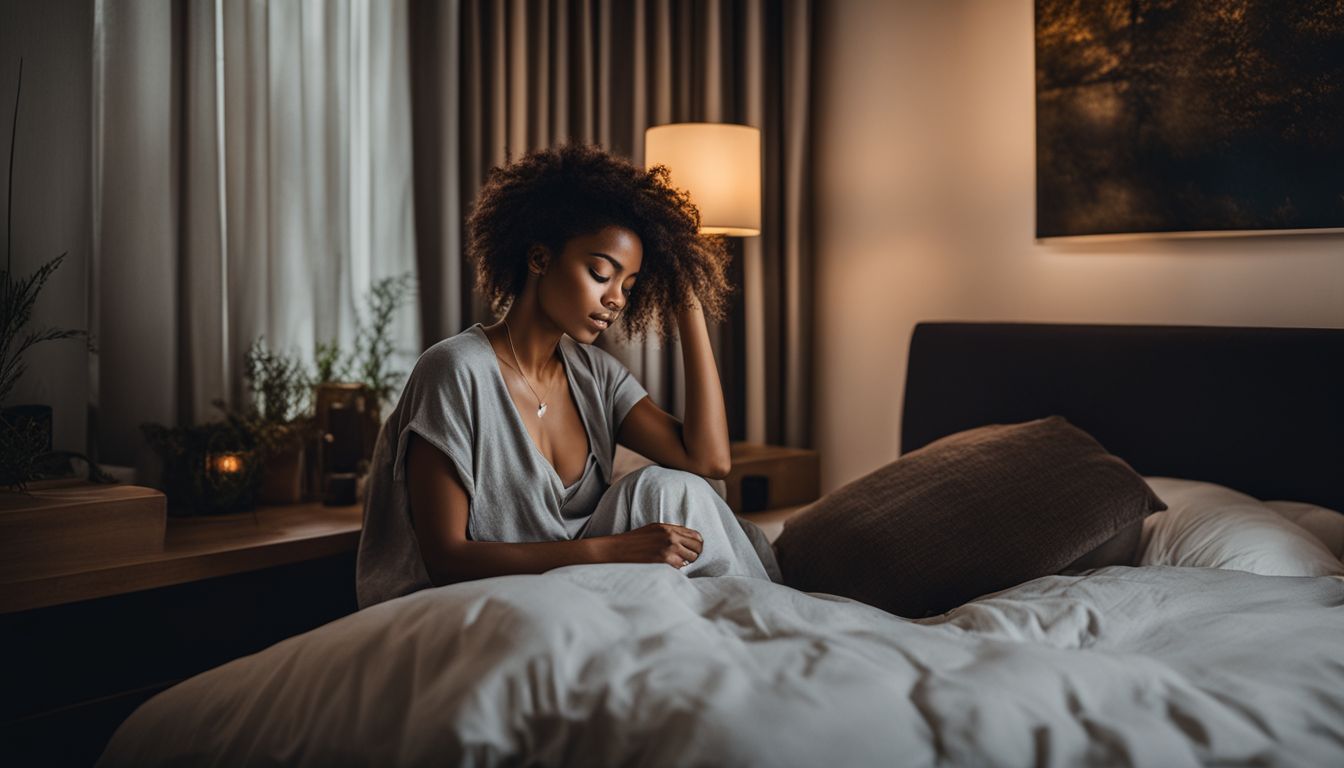
A steady sleep schedule is key for good rest. Going to bed and waking up at the same times each day helps your body stick to a routine. It can make falling asleep faster and waking up easier.
If this habit is broken, it might lead to poor sleep or even loss of sleep. Sleep disorders like insomnia may also show up if you ignore this daily pattern. So, try to set regular bedtimes every night, even on weekends!
Limiting caffeine and alcohol intake
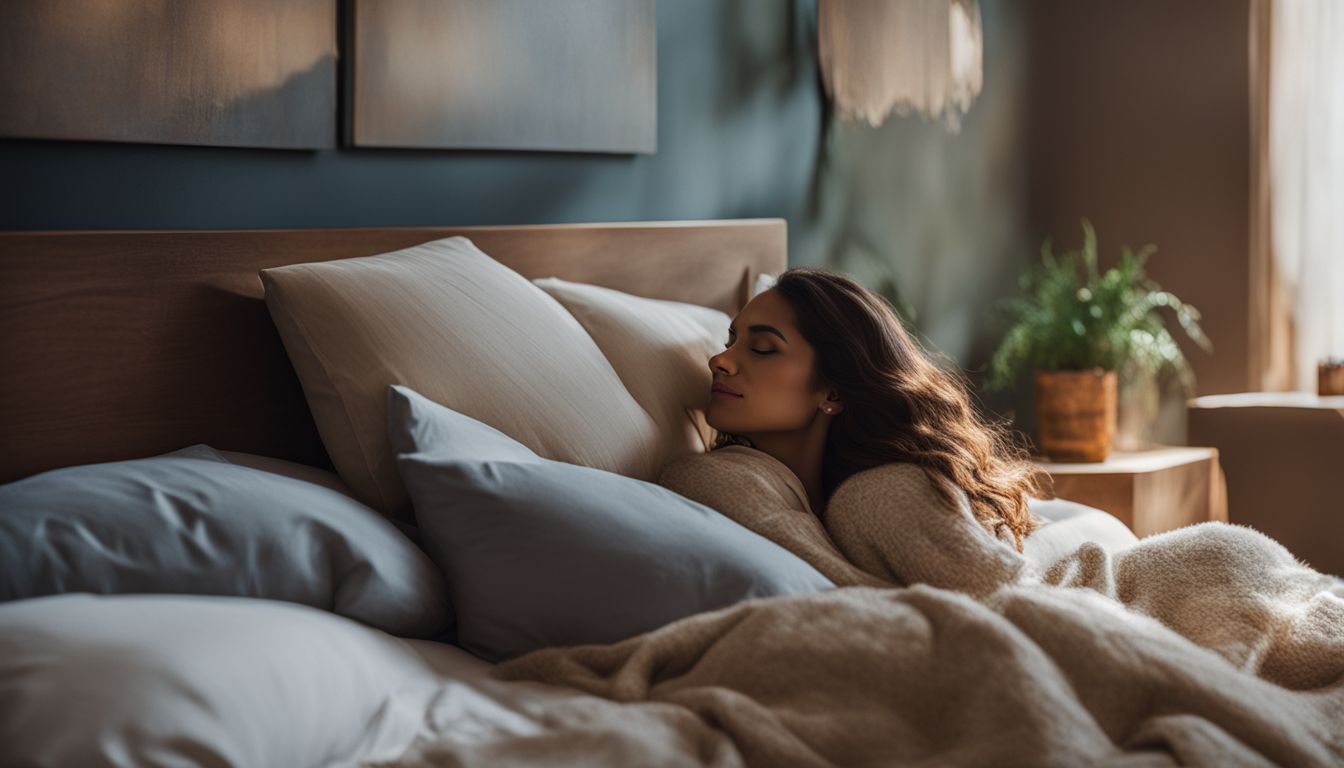
Caffeine and alcohol can disrupt your sleep, so it’s important to limit how much you have. Caffeine is found in coffee, tea, soda, and chocolate. It can keep you awake and make it harder to fall asleep at night.
Alcohol may make you feel sleepy at first, but it can lead to poor quality sleep later on. Both caffeine and alcohol can also cause more frequent trips to the bathroom during the night, interrupting your sleep even further.
To promote better sleep, try cutting back on caffeine and avoiding alcohol close to bedtime.
Creating a bedtime routine
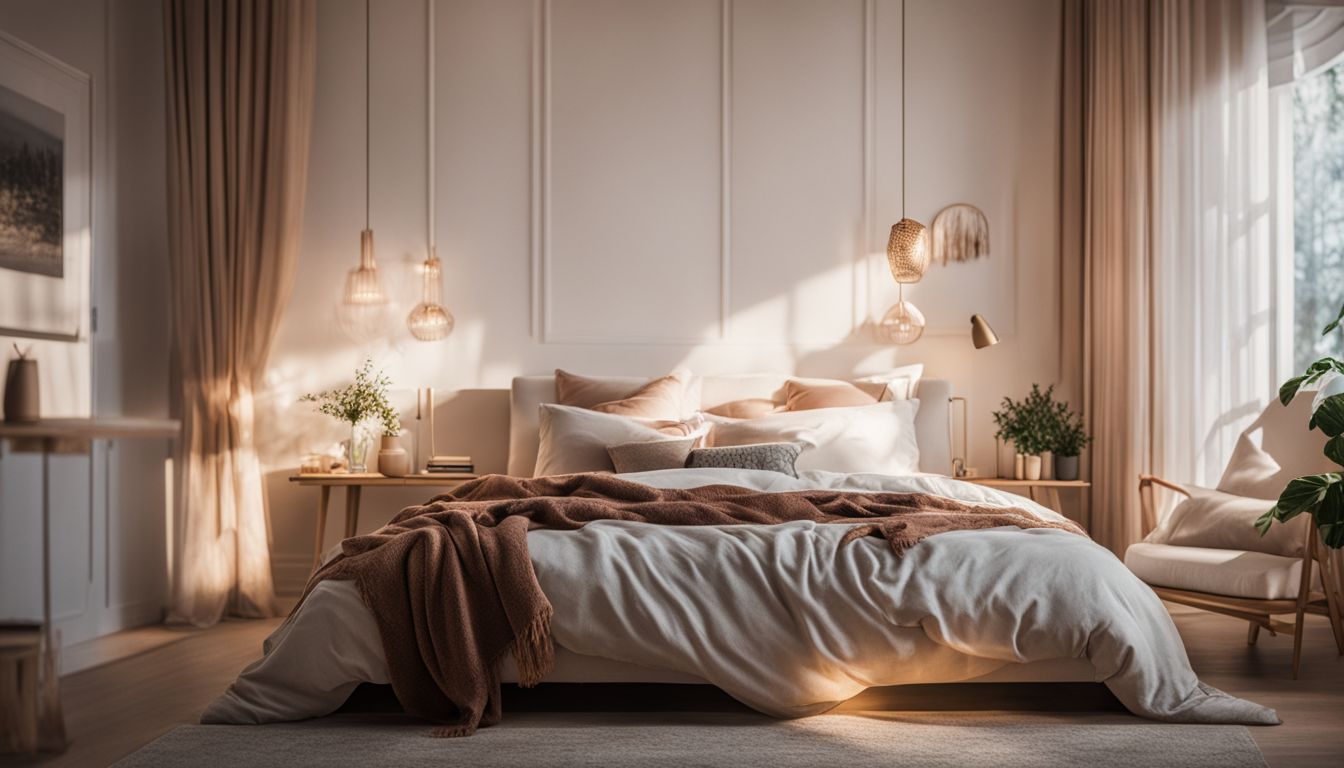
Having a consistent bedtime routine can greatly improve your sleep quality. Here are some tips to help you create a bedtime routine that promotes better sleep:
- Establish a regular sleep schedule: Try to go to bed and wake up at the same time every day, even on weekends.
- Wind down before bed: Spend the last hour before bed engaging in relaxing activities such as reading a book, taking a warm bath, or practicing deep breathing exercises.
- Avoid stimulating activities: Stay away from electronic devices, such as smartphones and laptops, which emit blue light that can disrupt your sleep. Instead, opt for activities that promote relaxation and calmness.
- Create a comfortable sleep environment: Make sure your bedroom is cool, quiet, and dark. Use earplugs or white noise machines to block out any disruptive sounds.
- Limit caffeine and alcohol intake: Avoid consuming caffeinated drinks or alcohol close to bedtime, as these can interfere with your sleep.
- Stick to a pre-sleep ritual: Develop a routine of doing the same activities every night before bed. This signals to your body that it’s time to wind down and prepares you for sleep.
How Technology Can Impact Sleep
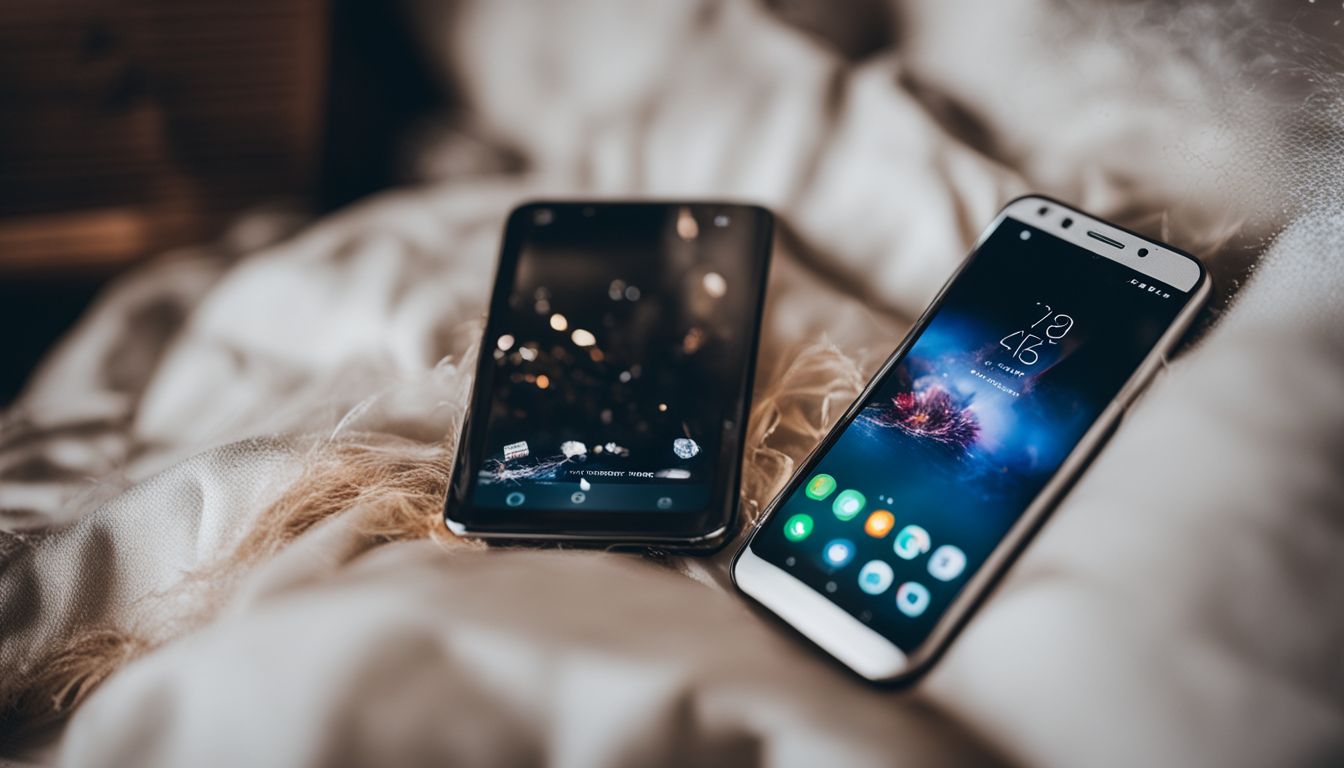
Using electronic devices in bed can disrupt sleep due to the blue light exposure and the stimulation from content on these devices.
Blue light exposure

Blue light exposure from electronic devices such as smartphones, tablets, and computers can disrupt our sleep patterns. Blue light suppresses the production of melatonin, a hormone that helps regulate sleep-wake cycles.
This makes it harder for us to fall asleep and stay asleep at night. It’s important to limit our exposure to blue light, especially in the evening before bedtime. One way to do this is by using software or apps that reduce the amount of blue light emitted by our devices.
Another strategy is to avoid using electronic devices close to bedtime and instead engage in relaxing activities that promote better sleep.
Using electronic devices in bed
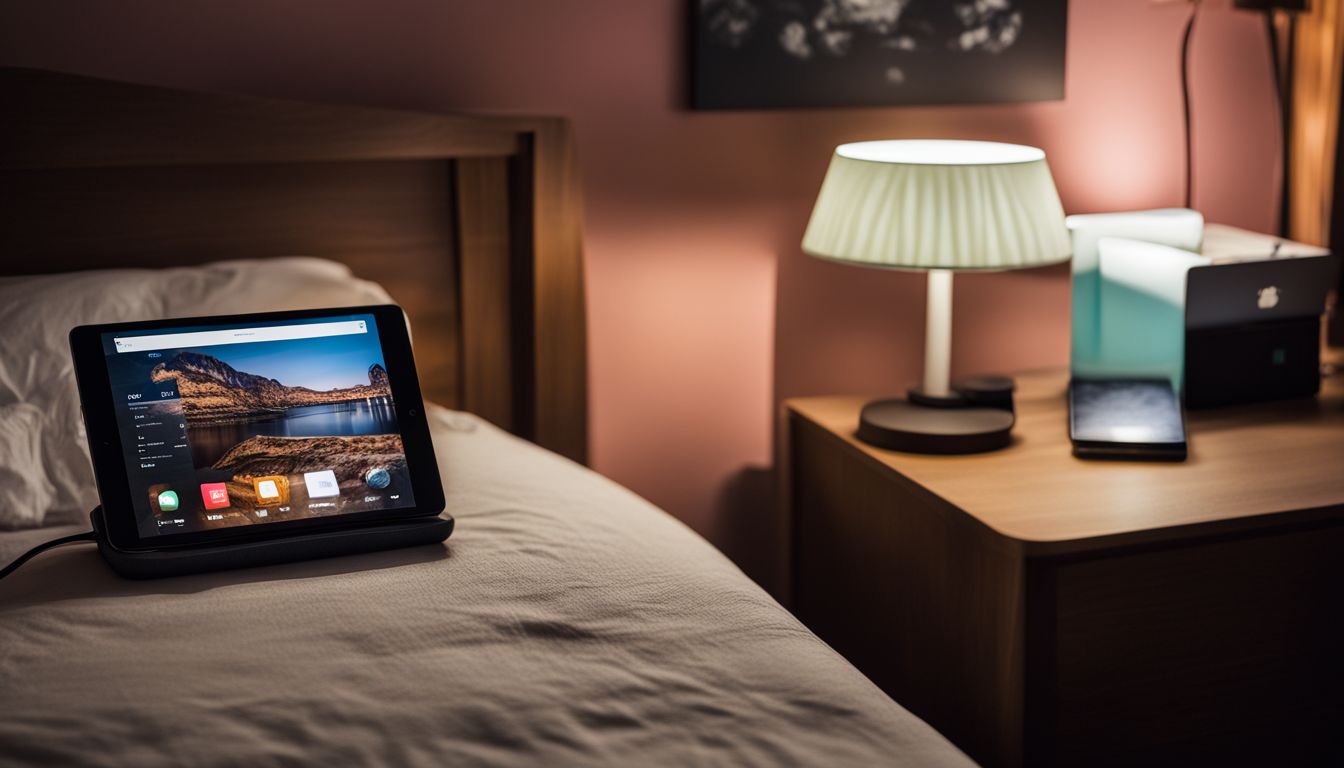
Using electronic devices in bed can have a negative impact on your sleep. The blue light emitted by screens, such as smartphones and tablets, can disrupt your body’s natural sleep-wake cycle and make it harder for you to fall asleep.
This is because the blue light suppresses the production of melatonin, a hormone that helps regulate sleep. So, it’s best to avoid using electronic devices in bed if you want to get a good night’s sleep.
Instead, create a bedtime routine that promotes relaxation and prepares your body for restful sleep.
Setting boundaries with technology

Setting boundaries with technology can greatly improve your sleep. Here’s how:
- Limit screen time before bed: Avoid using electronic devices, such as smartphones or tablets, at least 30 minutes before you sleep.
- Turn off notifications: Disable or silence alerts from apps and social media platforms to prevent interruptions during your sleep.
- Create a tech-free zone: Keep your bedroom free of electronic devices to promote relaxation and better sleep.
- Use night mode or filters: Adjust the settings on your devices to reduce blue light exposure, which can disrupt your body’s natural sleep-wake cycle.
- Set a technology curfew: Establish a specific time in the evening when you will stop using electronic devices to give yourself time to unwind before bed.
The Impact of Diet and Exercise on Sleep

Eating a balanced diet and engaging in regular physical activity can have a significant impact on your sleep quality. By avoiding heavy meals before bed and incorporating exercise into your daily routine, you can promote better sleep.
To learn more about these habits and their effects on sleep, keep reading.
Eating a balanced diet

A balanced diet plays a crucial role in promoting good sleep. Certain foods contain nutrients that can help regulate sleep patterns and promote relaxation. For example, foods rich in tryptophan, like turkey and bananas, can boost the production of serotonin, a hormone that helps regulate sleep.
Additionally, magnesium-rich foods like leafy greens and nuts can promote muscle relaxation. On the other hand, consuming heavy meals close to bedtime or eating sugary snacks can disrupt sleep by causing indigestion or fluctuations in blood sugar levels.
By making healthy food choices throughout the day and avoiding heavy meals before bed, you can support better sleep quality and overall well-being.
Regular physical activity

Regular physical activity is an important daily habit that can positively impact sleep. Engaging in exercise helps to promote better sleep quality and duration. When we exercise, it boosts the production of endorphins, which are natural chemicals in our body that help us feel good and reduce stress.
In addition, regular physical activity can also tire out our muscles, making it easier for us to fall asleep at night.
Studies have shown that people who engage in regular physical activity experience fewer sleep disturbances and have a lower risk of developing insomnia. Additionally, exercise has been found to improve muscle strength and overall fitness, which contributes to better overall health.
It’s important to note that exercising too close to bedtime may actually make it more difficult for some individuals to fall asleep. It increases alertness and raises core body temperature, which could interfere with the body’s natural sleep-wake cycle.
Therefore, it’s recommended to finish your workout at least a few hours before bed so that your body has time to cool down and relax before sleeping.
Avoiding heavy meals before bed
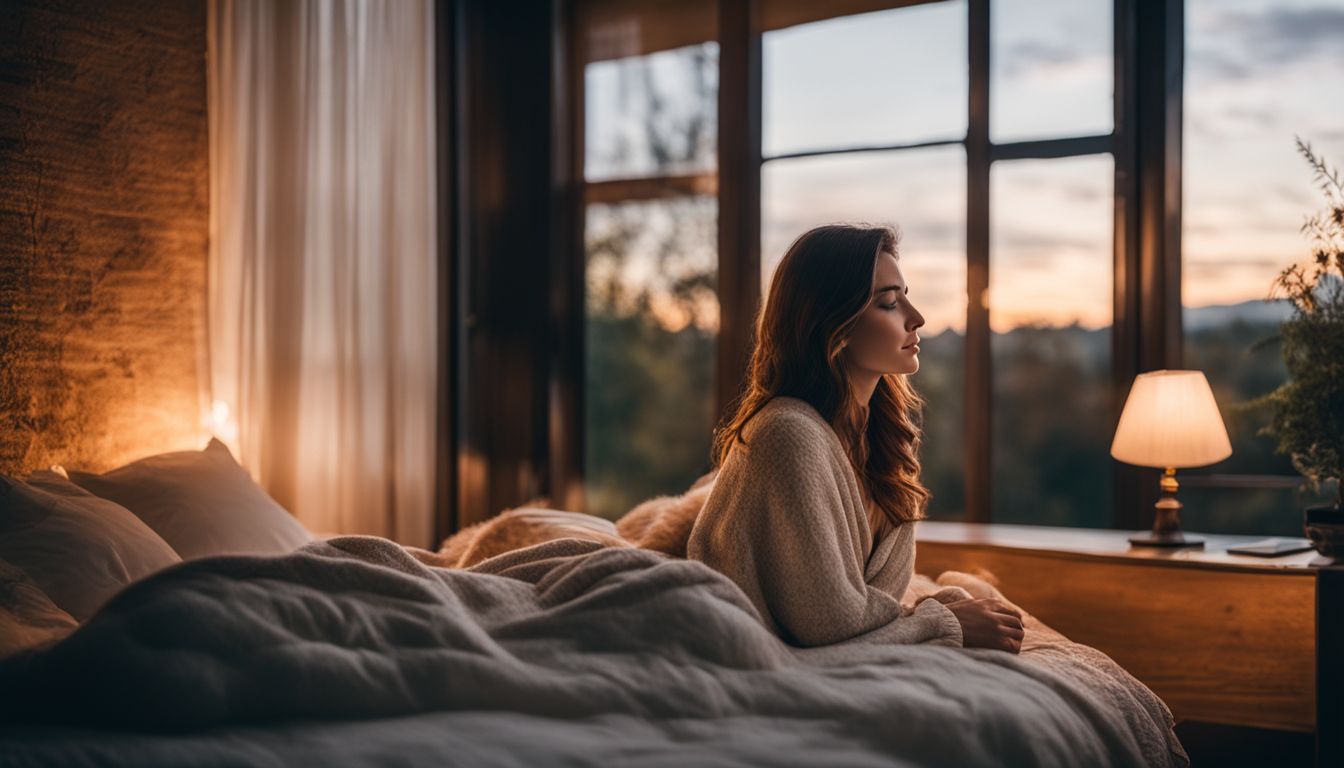
Eating a big meal right before bedtime can disrupt your sleep. When you eat a heavy meal late at night, your body has to work harder to digest the food, which can make it difficult for you to fall asleep and stay asleep throughout the night.
Additionally, lying down after eating can cause acid reflux or heartburn, making it even harder for you to get comfortable and drift off to sleep. It’s best to avoid heavy meals at least two hours before going to bed so that your body has time to digest properly and allow for a restful night’s sleep.
Environmental Factors That Affect Sleep
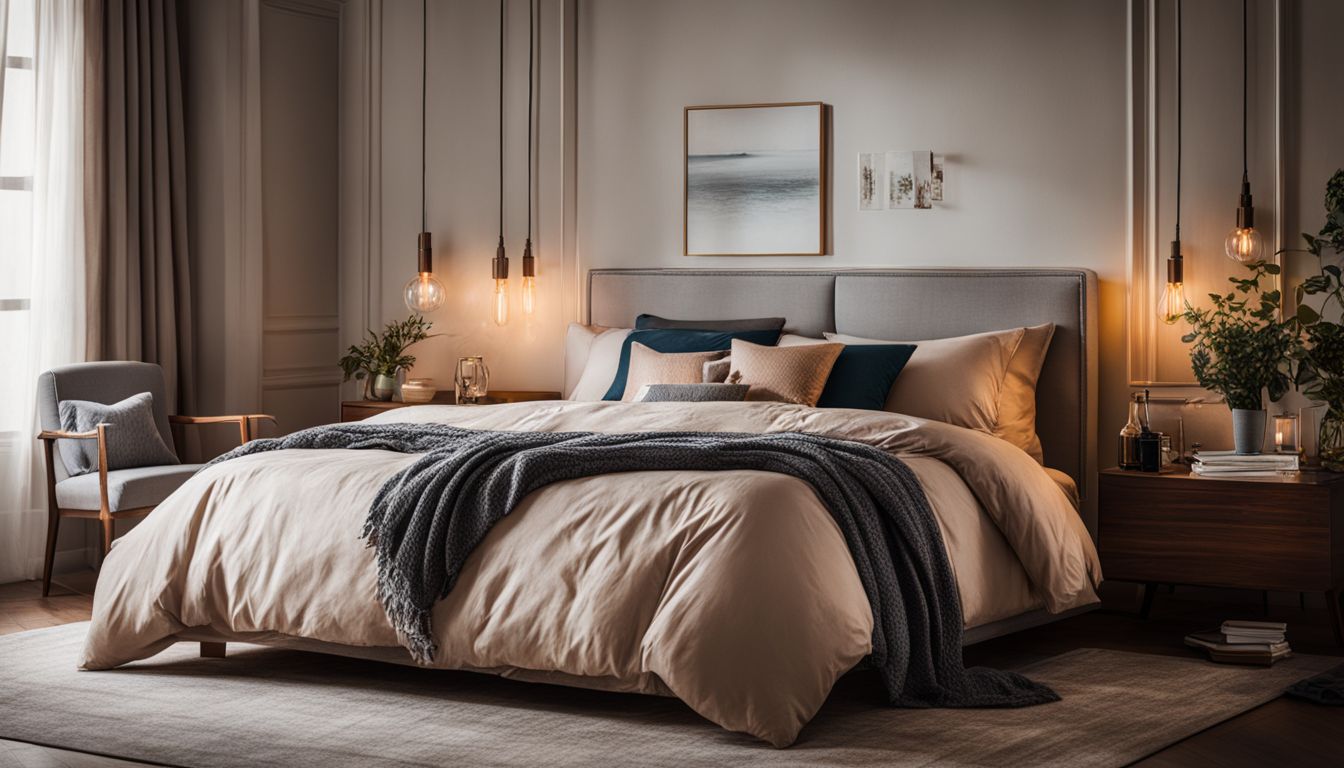
Creating a comfortable sleep environment, managing noise and light levels, and controlling temperature are all important factors in getting quality sleep.
Creating a comfortable sleep environment
Having a comfortable sleep environment is crucial for getting a good night’s sleep. Here are some factors to consider:
- Choose a mattress and pillows that provide adequate support and comfort for your body.
- Keep your bedroom clean, tidy, and free from clutter.
- Use blackout curtains or eye masks to block out any light that could interfere with your sleep.
- Keep the temperature of your bedroom cool and comfortable, between 60 – 67 degrees Fahrenheit.
- Use white noise machines or earplugs to drown out any background noises that may disrupt your sleep.
- Make sure your bedroom is well ventilated and has good airflow.
- Use soothing scents like lavender or chamomile to create a calm and relaxing atmosphere in your bedroom.
Managing noise and light levels
To improve your sleep, it’s important to manage the noise and light levels in your environment. Excessive noise can disrupt your sleep and make it harder for you to fall asleep or stay asleep.
Consider using earplugs or a white noise machine to block out any unwanted sounds. Additionally, keeping the room dark can help signal to your body that it’s time to sleep. Use blackout curtains or an eye mask to keep out any light that might be interfering with your restful slumber.
Excessive noise and light can have a negative impact on the quality of our sleep. Noise disturbances can make it difficult for us to fall asleep or stay asleep throughout the night, while bright lights can interfere with our body’s natural production of melatonin, a hormone that helps regulate our sleep-wake cycle.
To combat these disruptions, try using earplugs or a white noise machine to drown out any unwanted noises and create a peaceful sleeping environment. You may also want to invest in blackout curtains or an eye mask to block out any excess light that may be coming into your bedroom.
Temperature control
Maintaining a comfortable temperature in your sleep environment is crucial for getting a good night’s rest. When the room is too hot or too cold, it can disturb your sleep and make it harder to fall asleep or stay asleep.
Additionally, extreme temperatures can also affect the quality of your sleep by causing discomfort and restlessness. It is important to keep the room at a moderate temperature that promotes optimal sleep conditions.
Remember to adjust your bedding and clothing according to the season, ensuring that you are neither too hot nor too cold during the night.
Stress and Mental Health’s Role in Sleep

Managing stress levels
Stress can have a big impact on our sleep. When we’re stressed, it can be harder to fall asleep and stay asleep throughout the night. Additionally, poor sleep can also make us more susceptible to stress, creating a vicious cycle.
It’s important to find ways to manage stress levels for better sleep. One effective strategy is practicing relaxation techniques like deep breathing or meditation. Another helpful step is seeking support for any mental health issues that may be contributing to stress.
By managing our stress levels, we can improve the quality of our sleep and overall well-being.
Practicing relaxation techniques
Practicing relaxation techniques can help improve your sleep. Here are some techniques you can try:
- Deep breathing: Take slow, deep breaths to relax your body and mind.
- Progressive muscle relaxation: Tense and then relax each muscle group in your body, starting from your toes and working up to your head.
- Meditation: Focus on your breath or a calming image to quiet your thoughts.
- Guided imagery: Imagine yourself in a peaceful place, such as a beach or forest, using all of your senses.
- Mindfulness: Pay attention to the present moment without judgment, focusing on sensations like the feeling of your breath or the sounds around you.
- Yoga or stretching: Gentle movements can help release tension and promote relaxation.
- Aromatherapy: Use essential oils like lavender or chamomile to create a relaxing environment.
- Journaling: Write down any thoughts or worries before bed to clear your mind.
Seeking support for mental health issues
If you’re experiencing mental health issues that are affecting your sleep, it’s important to seek support. Mental health problems like depression, anxiety, and stress can disrupt sleep patterns and make it difficult to get a good night’s rest.
Seeking help from a healthcare professional or therapist can provide you with the guidance and tools needed to manage your mental health symptoms effectively. They can also help you develop coping mechanisms and relaxation techniques that promote better sleep.
Remember, addressing mental health concerns is essential for improving both your emotional well-being and the quality of your sleep.
Conclusion

In conclusion, neglecting important daily habits can significantly impact your sleep. Whether it’s sticking to a consistent sleep schedule, limiting caffeine and alcohol intake, or creating a relaxing bedtime routine, these habits play a crucial role in promoting quality sleep.
Additionally, factors like technology usage before bed, diet and exercise choices, environmental factors, and managing stress levels all contribute to better sleep hygiene. By prioritizing these daily habits and making necessary adjustments, you can improve your sleep quality and overall well-being.
FAQs
1. What are some daily habits that could affect my sleep?
Some daily habits that could affect your sleep include consuming caffeine or alcohol before bed, using electronic devices close to bedtime, and having an inconsistent sleep schedule.
2. How can I improve my sleep if I’m ignoring these daily habits?
To improve your sleep, you can try establishing a regular sleep routine, creating a relaxing bedtime routine, avoiding stimulating activities before bed, and creating a comfortable sleeping environment.
3. Can lack of quality sleep affect my overall health?
Yes, lack of quality sleep can have negative effects on your overall health. It can lead to increased risk of chronic conditions like obesity, diabetes, and heart disease as well as impact cognitive function and emotional well-being.
4. Is it necessary to consult a doctor if my sleep is suffering due to these habits?
If you’re consistently experiencing poor quality or insufficient sleep even after making changes to your daily habits, it may be beneficial to consult with a healthcare professional who specializes in sleep disorders for further evaluation and guidance.







